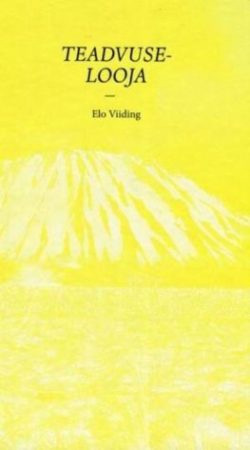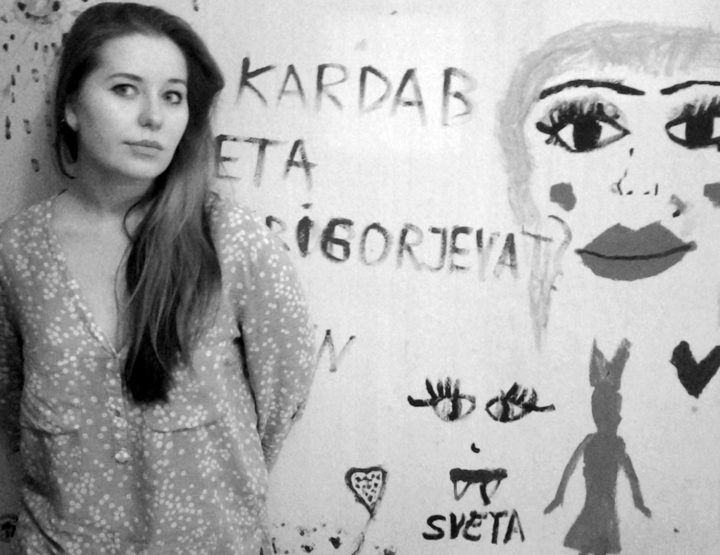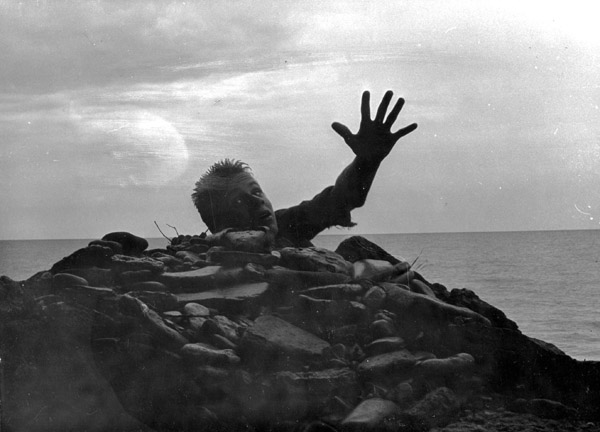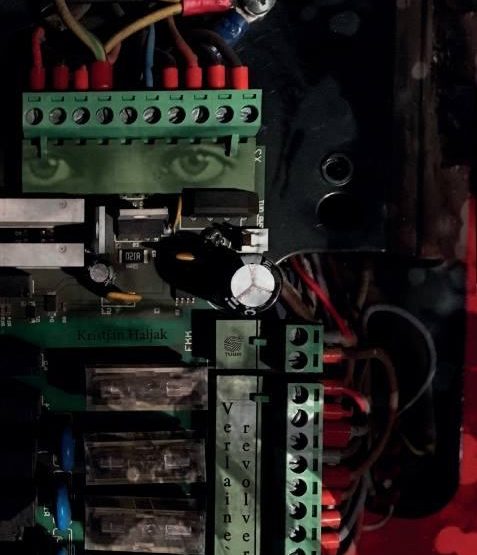You could say Doris Kareva (b. 1958) is one of Estonia’s most renowned female poets and has published nearly twenty poetry collections, though to do so omits the fantastic detail of her writing; you could say Doris is a well-known translator, though this doesn’t tell us about the incredible skill of her translations; you could say Doris is a conceptual author who has written texts used by many Estonian composers, but this doesn’t convey the beauty of what those pieces sound like. All one can do is begin reading Kareva’s works and develop a conception of her universe.
Kareva’s universe is a multidimensional mosaic in which every piece is fit together with care. To attempt to outline her life, I’d point out the poet’s graduation from the University of Tartu cum laude, her long term as the Secretary General of the Estonian National Commission for UNESCO, her work as an editor of the cultural weekly Sirp, and the literary journal Looming (still to this day), her two cultural prizes awarded by the Republic of Estonia, and her nomination for the Nobel Prize in Literature. Not to mention her innumerable translations into Estonian and her original poetry into Latvian, Finnish, German, French, Italian, English, and many other languages. In addition, Kareva mentors young writers, translators, and other creative individuals who haven’t decided if they should lean more toward translation or poetry. As well as her collaborations with the Estonian composers Pärt Uusberg, Tõnu Kõrvits, Olav Ehala, Rasmus Puur, and others. Several of Kareva’s poems have been adapted and sung by hundreds of thousands at the Estonian Song and Dance Festival.
This interview focuses on the beginning of Kareva’s creative path. How anyone discovers that path for themselves is always a mystery. Some do later in life or fail to find it at all, while for others, it begins with their very first steps.
How would you define yourself first?
I suppose I’ve mostly said poet, translator, and editor in that order, as that’s how they came into my life. When I was foremost a poet, then I didn’t yet know how to edit, and now that I believe I’m getting better and better as an editor, writing poetry has become a luxury.
What was the first attempt you made at writing?
I started writing things when I was four, though I can’t remember the very beginning exactly. All kinds of thoughts can cross your mind, and my parents wrote some down. My mother worked at the Estonian National Library, where they had a tradition of displaying children’s creative works every New Year’s. Mine was always a handwritten poem. Every December, heart pounding in my chest, I’d pick out the best poem I’d written that year and read it aloud. Curiously, the display was filled with drawings and all kinds of interesting crafts, but no one else thought to write poems.
What were the first poems you published?
My very first published poem appeared in our school almanac, Trükitähed (Letters), when I was eight: “Far from the roads, deep in the woods / there’s a little cottage. / Even a mossy well in the yard, missing only a master. / Early every dawn / no crowing can be heard. / Silence falls over the yard, the house, / not even a mouse in sight …” and so forth. Looking back, I realize that adults read it in a completely different way, but at the time, I simply had this vision without any sort of underlying meaning and with the strange, unsettling feeling that came with it. I couldn’t cope with that feeling, so I wrote it down. And that’s the first that was published.
As a teenager, I attended a writing/theater club, and our instructor wanted to stage The Little Prince. As she could tell that many of us dabbled in writing, shetold us to bring our notebooks to the meeting, and maybe the prince’s story could be interwoven with our poems. That’s just what we did, and we all exchanged notebooks. But somehow, the notebook containing my poems ended up in the hands of Arvi Siig, the editor of the youth magazine Noorus at the time.
Arvi invited me to his office. I can still vividly recall that when he stood at his desk and leaned forward to shake my hand, it felt like he filled the whole room. I felt tiny in that little nook, marveling at how tall he was, arcing over the ceiling. The first selection of my poems was published in Noorus when I was 14.
To whom did you first show your poems? A literature teacher?
My literature teacher often dismissed me from class—to work on the school billboard, for example. But it might have been around eighth or ninth grade when I realized I couldn’t pick out which of my poems were better or worse. I then came up with a very clever device, by my own way of thinking. I entrusted my notebook to my closest friends and asked them to make checkmarks next to the poems they liked best. I couldn’t wait to find out which were good and which weren’t. But no! It turned out the anonymous checkmarks were distributed quite evenly throughout the notebook. The experiment wasn’t a failure, of course, because I learned a thing or two about my friends, thanks to that.
If you hadn’t picked literature, then what would you have chosen?
I haven’t picked anything. I remember that in tenth grade, we were given a career-suitability test with many interesting questions—the kind where you can’t guess what your response might lead to. So, I answered in complete honesty. Believe it or not, I recently came across that old test half a century later. “Writer,” “philosopher,” and “journalist” were more or less even matches. Then came a bit of blank space before “biologist.”
My literature teacher told me that if you have a good idea in the middle of the night but can’t be bothered to get up and jot down a couple of lines, then you’re not a true poet and can sleep on in peace. Do you ever get up in the middle of the night and write down a good idea?
That’s exactly right. I remember Juhan Viiding[1] also said that the only difference between a poet and a non-poet is that the poet will get up in the middle of the night and write down lines they’ve thought of. A non-poet won’t be bothered. I usually get up. You can never have too many special ideas and shouldn’t let them go to waste.
What was the first text that made you want to start translating?
My first experience was thanks to my English literature teacher, who assigned us to translate Robert Frost’s Stopping by Woods on a Snowy Evening. Some students were bothered by such a difficult task, but I was enthralled. I remember staying up all night to translate Frost’s poem, trying it one way and another, and that was the moment the kitten’s nose was poked into the milk, so to say. A few years later, I discovered Anna Akhmatova’s poems—enchanting gestures, pauses, and gazes that somehow beckoned to be mimicked.
When Sirp organized a poetry translation contest, I submitted my attempts and shared first place with Kalju Kangur. That gave me a little courage to continue.
The next important author I discovered in the early 1980s was Emily Dickinson. It had been an especially difficult year with the deaths of several people close to me. I felt I hadn’t the patience to read contemporary literature; it all seemed so superficial. But when I happened to come across Dickinson (who wasn’t well known in Estonia), I knew I wanted to try to put her words into Estonian. I healed through translation, in a way. It was true therapy. It helped me process my grief.
What is the best book format, in your opinion?
Nothing very big and nothing with entirely soft covers; they just need to be slightly flexible. It should be comfortable to hold and stick into a bag or a pocket to take on a plane. It’s undoubtedly a familiar topic to anyone who gets mildly panicked whenever they don’t have anything to read because you have to get your daily dose of art somehow. A compact book that has little text but many thoughts—yes, that’s the best type of book for me.
If bookworms are wanderers in a sense, then what are they seeking?
I believe all bookworms are wanderers, and as the song goes, “each seeks their own.” They’re looking for their own world, their own reality, its reflection in different keys—in other words, for recognition in forms they haven’t realized yet. Reading is endless development—a way to foster understanding, sympathy, and communion in every initially unimagined direction. And that doesn’t only apply to literature, but to art as a whole.
Katja Novak (b. 1998) is a Ukrainian poet and translator, including Kareva’s poetry, who resides in Estonia.
[1] Juhan Viiding (1948–1995): an Estonian poet, actor, and director.





